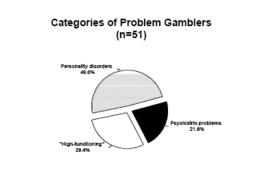This week in Massachusetts, a jury found Edward Donahue guilty of premeditated first-degree murder of his wife. The murder attracted media attention because of the shocking details of the crime. Donahue beat his wife to death with a baseball bat, then stashed her body in a container in his basement for a month before moving the body to a storage locker. He was arrested after a search uncovered the receipt to the storage facility. Donahue is said to have had a gambling problem [1]. In the trial, the prosecuting attorney argued that Donahue’s motive for killing his wife was to end the restrictions she placed on him to prevent him from spending money on his gambling activities [2]. While it cannot be determined that Donahue’s gambling behavior was the cause of this murder, problem gambling clearly was an important factor in Donahue’s marital relationship. In this case, the jurors were charged with deciding whether Donahue was insane, not whether he was guilty, which was an uncontested point. They determined that he was not insane. A study of male pathological gamblers treated in a psychiatric hospital may lend some insight into the relationship between gambling, family, and criminal behavior [3]. Fifty-one males admitted to a psychiatric university hospital for gambling problems between 1980 and mid-1990 were categorized into 3 groups: 1) those with severe psychiatric problems (e.g., schizophrenia, manic-depression), 2) “high-functioning” individuals who tended to be married, successful in their professions, and of high intelligence, and 3) those with serious personality disorders (e.g., anti-social personality). Twenty-one of these patients were participating in inpatient treatment and 30 were receiving outpatient treatment. Bellaire & Caspari recommend conducting a thorough psychiatric and neurological examination on problem gamblers at intake to become aware of possible psychiatric disorders. They also recommend assessing patient’s motivation for gambling, and working with the patient’s financial problems. Finally, patients’ treatment plans will differ depending on their individual situation. For example, psychopharmacology will be useful for some patients, while some form of family therapy will be important to others. The categorization of gamblers and treatment planning is not a simple matter. Individuals can belong to more than one of these three categories and the ideal treatment plan is meaningless to someone who does not enter treatment.
Sources:
- Hayward, E. (1997, October 21). Gambling habit eyed as motive. Boston Herald, pp. 7-8
- Dowdy, Z.R. (1998, May 5). Jury takes two hours, finds Donahue guilty in wife’s slaying. The Boston Globe, p. B03
- Bellaire, W., & Caspari, D. (1992). Diagnosis and therapy of male gamblers in a university psychiatric hospital. Journal of Gambling Studies, 8(2), 143-150.
This public education project is funded, in part, by The Andrews Foundation.
This fax may be copied without permission. Please cite The WAGER as the source.
For more information contact the Massachusetts Council on Compulsive Gambling,
190 High Street, Suite 6, Boston, MA 02110, U.S.





